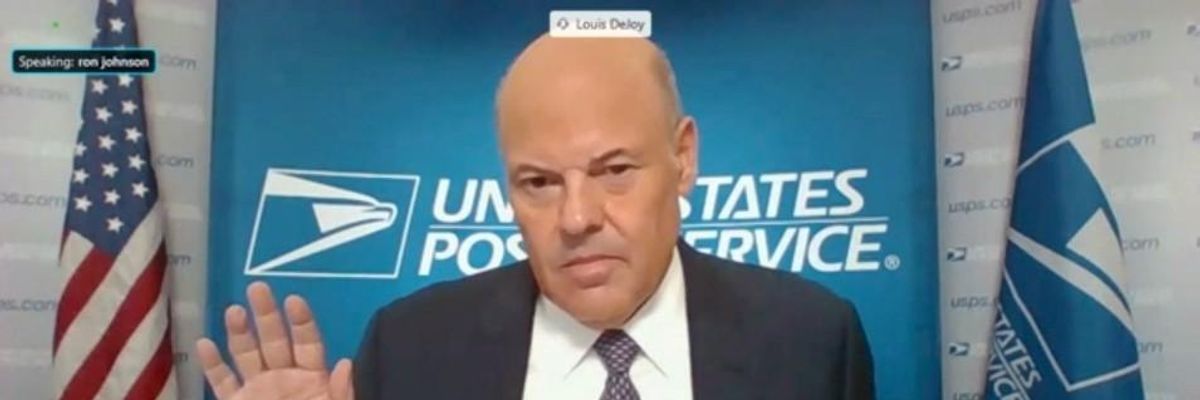The Democratic chairwoman of the House Committee on Oversight and Reform revealed Monday that she intends to issue a subpoena to Postmaster General Louis DeJoy for documents he has been withholding from Congress about recent U.S. Postal Service delays, concerns about November election mail, and any communications with the reelection campaign of President Donald Trump.
Rep. Carolyn Maloney (D-N.Y.) notified members of her committee about the subpoena (pdf) in a memorandum (pdf) that detailed the document requests and DeJoy's noncompliance. The postmaster general, a GOP megadonor appointed earlier this year by the Republican-controlled Postal Service Board of Governors, testified before the committee last week amid widespread condemnation of his suspended--but not reversed--operational changes to the USPS.
Maloney warned during the hearing that she would issue a subpoena if DeJoy failed to produce the requested documents by August 26. DeJoy responded with a Friday night letter (pdf) to Maloney that said in part, "I trust my August 24 testimony before the Committee on Oversight and Reform clarified any outstanding questions you had."
DeJoy also appeared before the Republican-controlled Senate Homeland Security and Governmental Affairs Committee on August 21. Maloney's memo on Monday explained that the subpoena, which she also shared with members, "includes in one place many requests previously made by Members of the House and Senate in writing and directly to Mr. DeJoy during his in-person testimony."
"The subpoena clarifies a number of previous requests based on information obtained to date in order to ensure that it captures all documents within the requested categories," she continued, "and it also makes clear as a legal matter that the production of these documents is mandatory."
Maloney's move was welcomed by Rep. Gerry Connolly (D-Va.), chairman of the House Oversight Subcommittee on Government Operations. Last week, Connolly sent DeJoy a letter demanding the postmaster general hand over any of his "secret communications with the Trump campaign."
"Mr. DeJoy's testimony before our committee has left us with more questions than answers," Connolly said in a statement. "He has repeatedly demonstrated an unwillingness to share documents and information with Congress, and we don't have time to wait for him to find a moral compass."
"Congress must assert itself. The public demands it," the Virginia Democrat added. "Today's action is a necessary step in our efforts to hold the Trump administration accountable for its deliberate sabotage of the Postal Service, and to restore confidence in this revered American institution."
From Democratic lawmakers to civil rights advocates, critics of DeJoy's operational changes have accused the postmaster general and Trump of intentionally slowing down mail service to impact the general election, in which the president is set to face Democratic presidential nominee Joe Biden.
Alarm over the November election--which is expected to see more mail-in ballots due to the ongoing coronavirus pandemic--has led to national protests pressuring the Senate to pass House-approved legislation designed to #SaveThePostOffice by providing the agency with at least $25 billion in emergency funding and reversing DeJoy's mail slowdown policies.
Along with the memo about the subpoena, Maloney on Monday sent a document request to Robert M. Duncan, chairman of the Postal Service Board of Governors, who testified before her committee last week with DeJoy.
"The Board of Governors had been withholding documents and information from other Members of Congress by citing a Justice Department opinion claiming that the Freedom of Information Act (FOIA) prohibits the disclosure of information to a Member of Congress who is not the Chair of a Committee--a baseless claim that has been thoroughly debunked by Democrats and Republicans alike," Maloney's office explained.
Writing in her capacity as chairwoman Maloney made "a number of requests for documents and information" previously sought by other lawmakers as well as additional documents sought during Duncan's testimony.
"If there are any questions about whether you are legally authorized to produce these documents," Maloney wrote to Duncan, "please let the committee know, and we will issue a subpoena to resolve these doubts and compel their production."
Maloney's memo and request came shortly before a D.C. Circuit Court of Appeals panel ruled 2-1 that the House can't go to court to enforce subpoenas because there is no law that makes them enforceable. Although the decision "dealt a severe blow" to the lower chamber's investigative power, Politico noted that "the House is likely to ask the full bench of the appeals court to take up the question."

